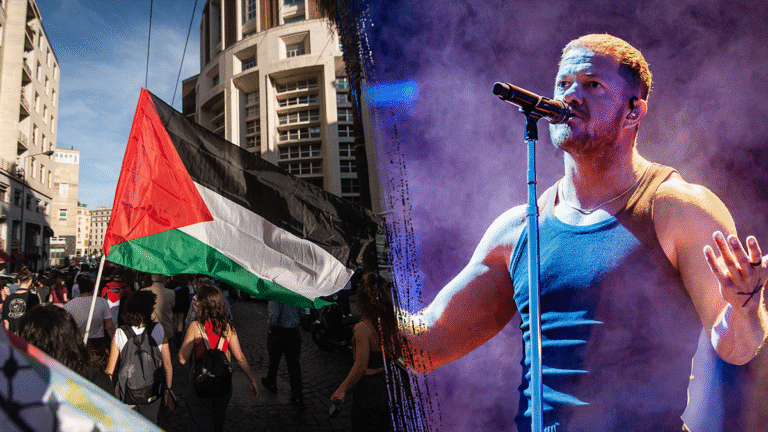Headline: Imagine Dragons Ignite Social Media Firestorm After Waving Palestinian Flag at Milan Concert…read more…
The American rock band Imagine Dragons has found itself at the center of a global controversy after frontman Dan Reynolds waved the Palestinian flag during a concert in Milan on Tuesday night. The moment, captured on video by fans and shared widely on social media platforms, has sparked intense reactions across the political and cultural spectrum, with supporters hailing the act as a courageous stance for human rights while critics accuse the band of engaging in divisive political theater.
The Incident
The band was performing at the Mediolanum Forum as part of their ongoing European tour when, midway through their hit song Demons, Reynolds picked up a Palestinian flag handed to him by a member of the audience. He held it high above his head before draping it over his shoulders and continuing the performance. The crowd erupted into a mixture of cheers and stunned silence.
Shortly afterward, Reynolds addressed the crowd, saying, “Music is about unity, about amplifying the voices of the unheard. No matter where you’re from, or what your beliefs are, we are all human. We all deserve peace.”
The symbolic gesture was met with a roar of approval from many in the arena, but as the videos spread online, the responses became far more polarized.
Reactions on Social Media
By Wednesday morning, the hashtag #ImagineDragons was trending on X (formerly Twitter), Instagram, and TikTok, with tens of thousands of posts discussing the incident. Some fans applauded Reynolds and the band for taking a stand during a time of escalating tension and humanitarian concern in Gaza and the West Bank.
“Imagine Dragons just earned my lifelong respect,” wrote one user on X. “So rare to see artists use their platform like this.”
Others, however, were not impressed. “Disappointed to see Imagine Dragons promoting a flag that’s been used to represent divisive politics,” another post read. “Stick to music, not international conflict.”
Some critics accused the band of “virtue signaling” and argued that such public gestures oversimplify a complex and deeply rooted geopolitical conflict. Pro-Israel advocacy groups quickly issued statements condemning the move, claiming it risks fueling anti-Israel sentiment.
Band Remains Silent — For Now
As of this writing, Imagine Dragons has not released an official statement addressing the controversy. Band representatives declined to comment when approached by multiple media outlets.
This isn’t the first time Reynolds has used his platform to highlight social and political issues. A longtime advocate for LGBTQ+ rights, mental health awareness, and religious reform, Reynolds has spoken openly about his views on justice and inclusion. Still, this latest act marks one of the most politically charged statements of his career.
Music and Politics: A Complicated Relationship
The incident adds to an ongoing debate about whether artists should use their stage as a platform for political expression. While some fans argue that music and politics are inherently intertwined — particularly for artists whose messages touch on issues of suffering, resistance, and unity — others prefer their concerts to be a space for entertainment rather than activism.
“Art has always been political,” said Dr. Livia Mancini, a professor of cultural studies at the University of Bologna. “From Bob Dylan to Rage Against the Machine, artists have historically used their platform to speak truth to power. What’s changed is how quickly those statements reverberate through a global audience thanks to social media.”
Indeed, the rapid virality of Tuesday night’s moment has brought renewed attention to the broader conflict in the Middle East, especially among younger audiences who may not have been deeply engaged with the issue before.
Fallout and Future Implications
It remains to be seen how the controversy will affect the band’s reputation and commercial standing. Ticket sales for the remainder of the European tour appear unaffected as of now, but there are already calls from some critics for boycotts and show cancellations in countries with strong pro-Israel sentiments.
On the flip side, Palestinian advocacy groups and human rights organizations have praised the band’s actions. The U.S.-based group Artists for Justice in Palestine issued a statement calling the gesture “a brave act of solidarity that echoes the growing international demand for justice, freedom, and equality for the Palestinian people.”
The Palestinian Ministry of Culture even weighed in, issuing a brief statement thanking the band for what it described as “an inspiring act of artistic courage.”
Industry Response
Music industry insiders are reportedly divided. One senior executive at a major record label, speaking anonymously, said: “It’s a high-stakes move. Artists today are walking a tightrope — fans expect authenticity, but also have strong, often conflicting views on global issues.”
Others suggest this may be a turning point in how artists approach political expression. With Gen Z audiences increasingly valuing social consciousness, bold moves like Reynolds’ may become more common — even if they come with backlash.
Conclusion
As Imagine Dragons prepares for its next performance in Zurich later this week, all eyes will be on whether Dan Reynolds repeats the gesture — or addresses the controversy publicly. What’s clear is that the conversation sparked in Milan has rippled far beyond the confines of a concert arena, becoming a lightning rod in a global debate that continues to polarize.
In an age where every gesture is magnified and dissected online, Imagine Dragons’ act of waving the Palestinian flag is more than just a fleeting concert moment — it’s a cultural flashpoint that reflects the complexities of speaking out, the risks of activism, an
d the enduring power of music to both unite and divide.



